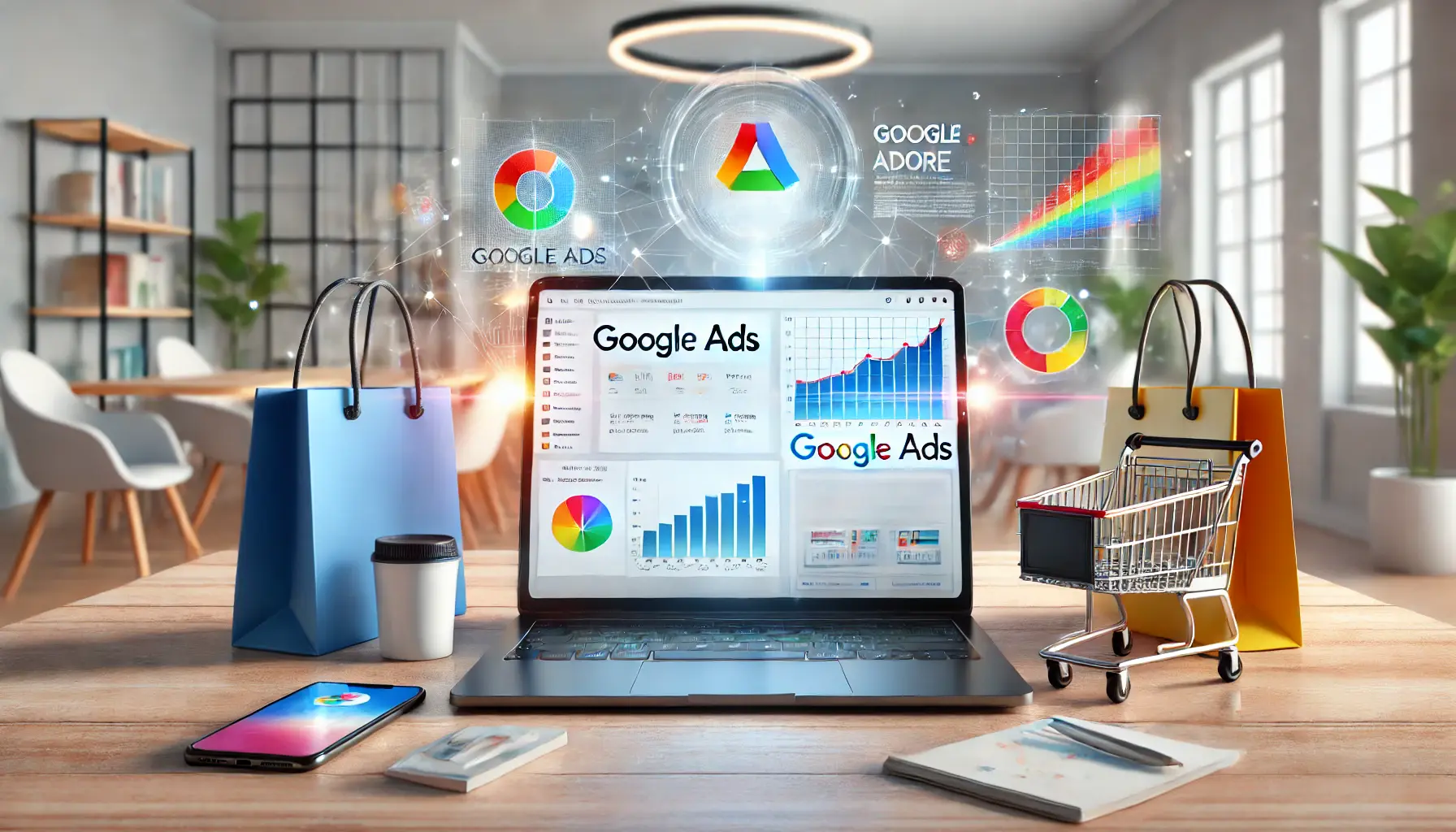Google Ads have become a cornerstone for businesses that want to extend their digital presence and effectively reach their target audience.
However, managing Google AdsAn online advertising platform developed by Google, allowing businesses to display ads on Google search results and partner websites. campaigns can be quite complex and time-consuming, especially for those who are new in the field of digital marketing.
That is where the management services of Google Ads come into play.
They offer professional expertise in optimizing campaigns for better ROIReturn on Investment, a measure of the profitability of an investment relative to its cost., ensuring your business achieves its advertising goals.
In this article, we will look at various aspects of Google Ads Management Services, starting with what they are and why they are important for the success of your business.
- What Are Google Ads Management Services?
- How to Choose the Right Google Ads Management Service
- Strategies Implemented by Google Ads Management Services
- Benefits of Investing in Google Ads Management Services
- How to Get the Most Out of Google Ads Management Services
- Maximizing Success with Google Ads Management Services
- Frequently Asked Questions About Google Ads Management Services
What Are Google Ads Management Services?
Google Ads Management Services are specific services developed to handle all aspects of your Google Ads campaigns, from keyword research to performance analysis.
These services take the burden of managing campaigns off your shoulders, allowing you to focus more on core business operations.
Whether you are a small or large enterprise, these services offer significant benefits for effective advertising.
One of the primary goals of these services is to ensure that your ads reach the right audience at the right time.
By using data-driven strategies, experts can fine-tune your campaigns for optimal performance.
But what exactly do these services entail?

Collaborative efforts in Google Ads Management Services ensure optimized campaigns and effective advertising strategies.
Definition and Importance of Management Services
Google Ads Management Services involve the end-to-end management of your advertising campaigns on Google’s platform.
This includes tasks such as:
- Keyword research: Identifying the most relevant and high-performing keywords for your business.
- Ad creation: Writing creative ad copy and designing engaging visuals to encourage clicks.
- Bid management: Setting and adjusting bids to maximize your budget’s efficiency.
- Performance monitoring: Tracking key campaign metrics to evaluate success and identify opportunities for improvement.
The importance of these services lies in their ability to streamline your advertising efforts.
They not only save time but also bring expert insights into campaign optimization.
With professional management, your business can avoid common pitfalls and achieve better results faster.

Professional tools and analytics power the key features of Google Ads Management Services, driving campaign success.
Key Features of Google Ads Management Services
Several features make these services invaluable for businesses:
- Comprehensive reporting: Gain access to detailed reports that show your campaign’s performance in real-time.
- Target audience analysis: Understanding your audience’s behavior and preferences to create highly relevant ads.
- Ongoing optimization: Regular adjustments keep your campaigns competitive and cost-efficient.
- Expert consultation: Leverage the knowledge of professionals who stay updated with the ever-changing landscape of Google Ads.
By understanding the components and advantages of Google Ads Management Services, businesses can make informed decisions about incorporating these services into their advertising strategies.
Google Ads Management Services streamline advertising efforts by handling complex tasks like keyword research and performance analysis, enabling businesses to focus on growth.
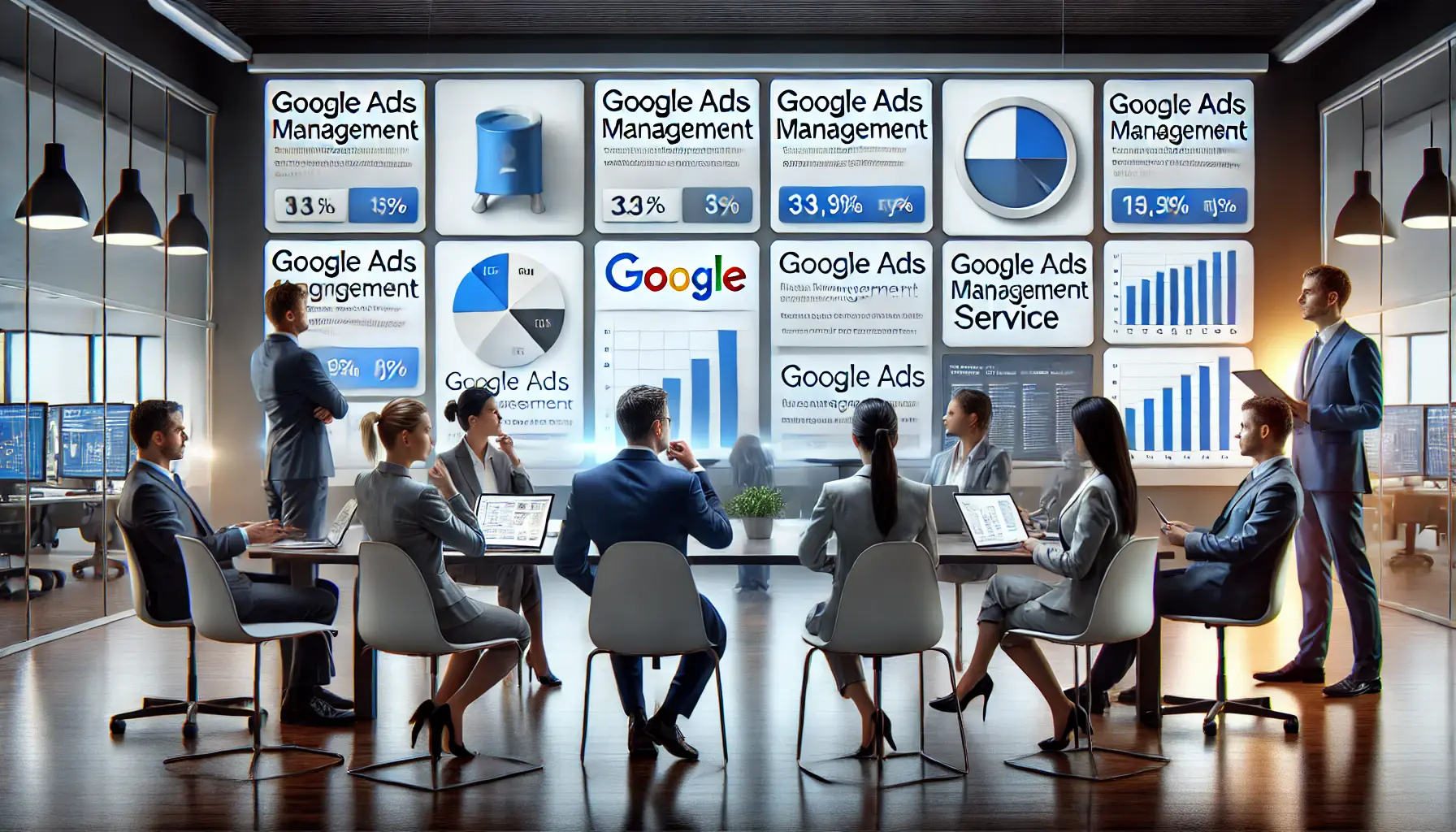
Evaluating service providers is key to selecting the right Google Ads Management Service for your business.
How to Choose the Right Google Ads Management Service
Choosing the right Google Ads Management Service is crucial for achieving your advertising goals and maximizing your return on investment (ROI).
With so many service providers available, selecting the one that aligns with your business objectives can feel overwhelming.
However, by evaluating specific factors and asking the right questions, you can make an informed decision that benefits your campaigns and overall strategy.

Strategic evaluation of business goals and budgets is essential for effective advertising planning.
Evaluating Your Business Goals and Budget
Before opting for a Google Ads Management Service, it is very important to outline your business objectives.
Ask yourself the following questions:
- What do I want my Google Ads campaigns to accomplish? Examples include lead generation, brand awareness, or sales growth.
- What is my advertising budget? Determine how much you are willing and able to allocate for professional services.
- Who is my target audience? Identify the platforms where you can effectively reach them.
Having a clear understanding of your goals and budget allows you to communicate effectively with potential service providers and assess their ability to meet your expectations.

Trust, transparency, and expertise define the qualities of a reliable management service provider.
Essential Qualities of a Reliable Management Service Provider
Not all Google Ads Management Services are created equal.
Look for providers that demonstrate these key qualities:
- Proven track record: Check for case studies, reviews, or testimonials showing how they have successfully managed campaigns for businesses similar to yours.
- Transparency: Providers should offer detailed reports and be open about their strategies and results.
- Custom strategies: Avoid one-size-fits-all solutions. A good provider will tailor campaigns to your unique business needs.
- Industry expertise: The provider should stay updated with the latest Google Ads trends and algorithm changes.

In-house and outsourced management services each offer unique advantages and challenges for businesses.
Comparing In-House vs. Outsourced Management Services
Another important consideration is whether to manage Google Ads campaigns in-house or outsource them to a third-party provider.
Each option has its pros and cons:
- In-house management: Offers greater control over campaigns but requires skilled personnel and significant time investment.
- Outsourced management: Provides access to expert knowledge and tools but requires trusting an external team with your campaigns.
Your choice should depend on your team’s capabilities, the complexity of your campaigns, and your budget.

Identifying red flags is crucial when selecting a reliable service provider to avoid potential pitfalls.
Red Flags to Watch for When Hiring a Service Provider
To avoid wasting time and money, be cautious of service providers that exhibit the following red flags:
- Lack of transparency: Avoid services that are unwilling to share their processes or results.
- Unrealistic guarantees: Be wary of promises such as “instant results” or “guaranteed top rankings,” as Google Ads success requires strategic planning and optimization.
- One-size-fits-all approaches: A reliable service provider will always tailor strategies to meet your business’s unique needs.
- Poor communication: Delays in response or unclear reporting are signs of unprofessionalism.
By carefully considering potential service providers and aligning them with your goals, you can select a Google Ads Management Service that delivers results and adds value to your digital marketing efforts.
Choosing a provider requires assessing their track record, transparency, and ability to customize strategies to your business’s needs.

Collaborative analysis and strategic planning define the approach of Google Ads Management Services.
Strategies Implemented by Google Ads Management Services
Google Ads Management Services are designed to help businesses maximize the impact of their advertising campaigns.
These services employ a range of advanced strategies to ensure your ads perform well, reach the right audience, and deliver the desired results.
By leveraging their expertise, these services help businesses optimize every aspect of their campaigns for success.

Effective keyword optimization drives the success of Google Ads campaigns by reaching the right audience.
Optimizing Keywords for Maximum Reach
Keyword optimization is a cornerstone of a successful Google Ads campaign.
Through professional Google Ads Management Services, deep keyword research is performed to identify:
- High-performing keywords: Keywords with high search volume and relevance to your business.
- Long-tail keywords: Specific phrases that help target niche audiences and reduce competition.
- Negative keywords: Words to exclude from campaigns to avoid irrelevant traffic and save budget.
By focusing on the right keywords, these services ensure your ads are displayed to users who are most likely to convert.

Creating compelling ad copy requires a blend of creativity and strategic analysis to drive conversions.
Creating Compelling Ad Copy That Converts
Ad copy plays a critical role in attracting clicks and driving conversions.
Google Ads Management Services specialize in crafting:
- Engaging headlines: Attention-grabbing headlines that spark curiosity and encourage clicks.
- Clear calls-to-action (CTAs): Phrases that guide users to take the desired action, such as “Buy Now” or “Learn More.”
- Value propositions: Highlighting unique benefits or features to differentiate your offerings from competitors.
Effective ad copy not only increases click-through rates (CTR) but also improves the overall quality score of your ads, lowering costs and boosting performance.

A/B testing and performance monitoring are essential techniques for optimizing ad campaigns based on data-driven insights.
A/B Testing and Performance Monitoring Techniques
A/B testing and robust monitoring methods are applied to ensure that performance is optimized in Google Ads campaigns.
These techniques involve:
- Testing ad variations: Running different versions of ads to see which one performs better.
- Analyzing metrics: Tracking KPIs such as CTR, CPC, and conversion rates.
- Continuous improvements: Using data-driven adjustments to enhance ad performance over time.
A/B testing and monitoring allow for the refinement of campaigns, ensuring maximum ROI and effective resource utilization.

Bid management and budget optimization are key components in ensuring the efficiency and success of digital marketing campaigns.
Bid Management and Budget Optimization
Effective bid management and budget optimization are critical to maximizing the value of your advertising spend.
Google Ads Management Services implement strategies such as:
- Automated bidding: Leveraging Google’s smart bidding features to adjust bids in real-time based on performance data.
- Manual adjustments: Fine-tuning bids for specific keywords or demographics to improve results.
- Budget allocation: Ensuring funds are distributed effectively across campaigns, ad groups, and keywords.
These strategies help businesses achieve their goals while minimizing unnecessary expenses.

Advanced analytics tools provide valuable insights for optimizing campaigns and improving performance.
Integrating Advanced Analytics Tools for Better Insights
Data is at the heart of successful advertising campaigns.
Google Ads Management Services utilize advanced analytics tools to gather actionable insights.
These tools provide:
- Audience behavioral analysis: Understanding how users interact with ads and what drives conversions.
- Competitor analysis: Identifying trends and strategies that keep competitors ahead.
- Custom reporting: Detailed reports tailored to business objectives, facilitating better decision-making.
By incorporating analytics tools, Google Ads Management Services enable businesses to make informed, data-driven decisions for the improvement of campaign outcomes.
These strategies form the backbone of effective Google Ads campaigns, ensuring that every dollar spent contributes to achieving your business objectives.
- Keyword optimization boosts relevance.
- Compelling ad copy enhances conversions.
- Performance monitoring refines campaigns.

Investing in Google Ads Management Services leads to measurable improvements in campaign performance and business growth.
Benefits of Investing in Google Ads Management Services
Google Ads Management Services offer numerous benefits to businesses looking to optimize their online advertising efforts.
By leveraging professional expertise, these services can help companies save time, reduce costs, and achieve measurable results.
Whether you are a small business or a large enterprise, the advantages of investing in these services can be significant.

Targeted campaigns optimize ad performance and deliver a higher return on investment.
Enhanced ROI Through Targeted Campaigns
One of the prime advantages of Google Ads Management Services is their ability to deliver a higher ROI.
By using advanced tools and strategies, these services ensure your ads target the right audience with precision.
This minimizes wasted ad spend and increases the probability of conversions.
Key tactics include:
- Demographic, interest, and behavior-based audience segment refinements: Ensuring ads are shown to the most relevant audience.
- Data-driven budget allocation: Using analytics to allocate budgets effectively.
- Keyword and placement optimization: Focusing on high-converting keywords and strategic ad placements.
With these methods, your campaigns generate better results while maintaining cost efficiency.

Expert management helps businesses save time and resources by optimizing tasks and improving efficiency.
Saving Time and Resources With Expert Management
For many businesses, especially those without dedicated marketing teams, managing Google Ads campaigns can be time-consuming.
Google Ads Management Services handle the intricacies of campaign management, including keyword research, bid adjustments, and performance monitoring.
This allows you to focus on other critical areas of your business while professionals optimize your ads.
Additionally, these services deploy automation tools to streamline campaign management, ensuring efficiency with minimal human intervention.

Optimizing ad campaigns leads to a reduction in cost-per-click, improving overall cost efficiency.
Reducing Cost-Per-Click (CPC) Through Optimization
Another key benefit is the reduction in cost-per-click (CPCCost Per Click, the amount you pay each time someone clicks on your ad.) achieved through continuous optimization.
Google Ads Management Services implement strategies such as:
- Improving ad quality scores: Creating relevant and engaging ad content.
- Utilizing negative keywords: Filtering out irrelevant clicks to save budget.
- Real-time bid adjustments: Fine-tuning bids based on performance data.
These strategies allow businesses to lower CPC while maintaining or even improving campaign performance.

Strategic market positioning and brand visibility improve a business’s presence and influence in its industry.
Attaining Better Market Positioning and Brand Visibility
Google Ads Management Services enhance your brand’s visibility in a competitive market.
By securing top positions in Google search results and across its display network, your business gains wider exposure.
Key strategies include:
- Remarketing campaigns: Reaching users who have previously visited your website or interacted with your ads.
- Display ads: Building brand awareness among new audiences.
- Location-based targeting: Connecting with local customers to boost engagement.
Improved market positioning not only drives traffic but also establishes your brand as a trusted player in your industry.
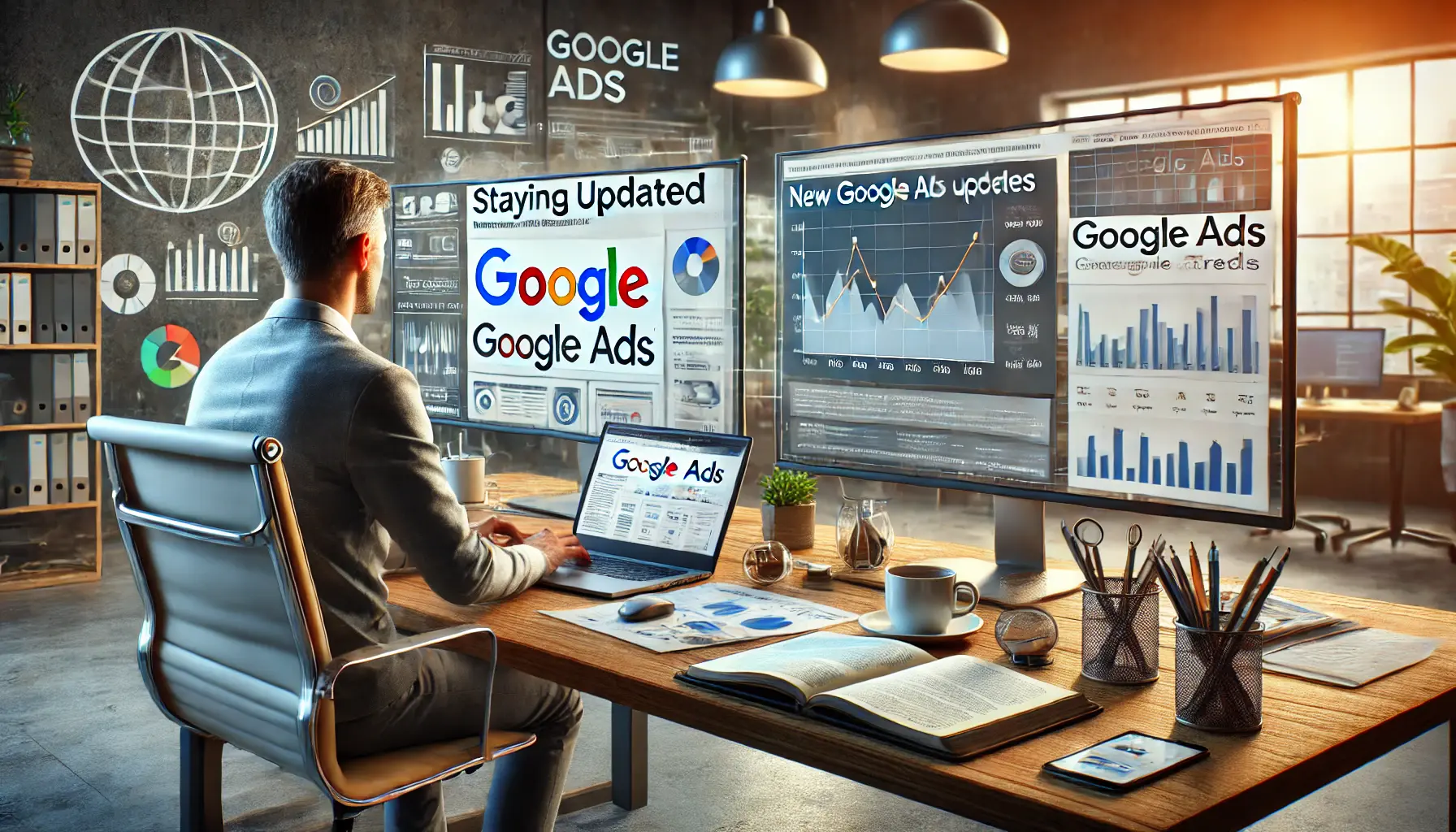
Staying informed on the latest Google Ads trends is crucial for optimizing campaigns and maintaining a competitive edge.
Staying Updated With the Latest Google Ads Trends
The digital advertising landscape is constantly evolving, and staying ahead of trends is essential for success.
Google Ads Management Services employ professionals who stay updated on best practices and platform changes.
Benefits include:
- Addressing algorithm changes: Ensuring ad visibility and performance remain unaffected by updates.
- Exploring new ad formats: Testing features like Responsive Search Ads or Performance Max campaigns.
- Leveraging emerging technologies: Using AI-driven optimizations and predictive analytics for better results.
By keeping up with trends, your campaigns remain competitive and deliver long-term value.
Investing in Google Ads Management Services ensures your advertising efforts are efficient, effective, and aligned with your business goals.
These benefits make professional management an invaluable asset for achieving sustained growth in the digital marketplace.
Investing in these services helps achieve higher ROI, better audience targeting, and sustained growth through professional expertise.
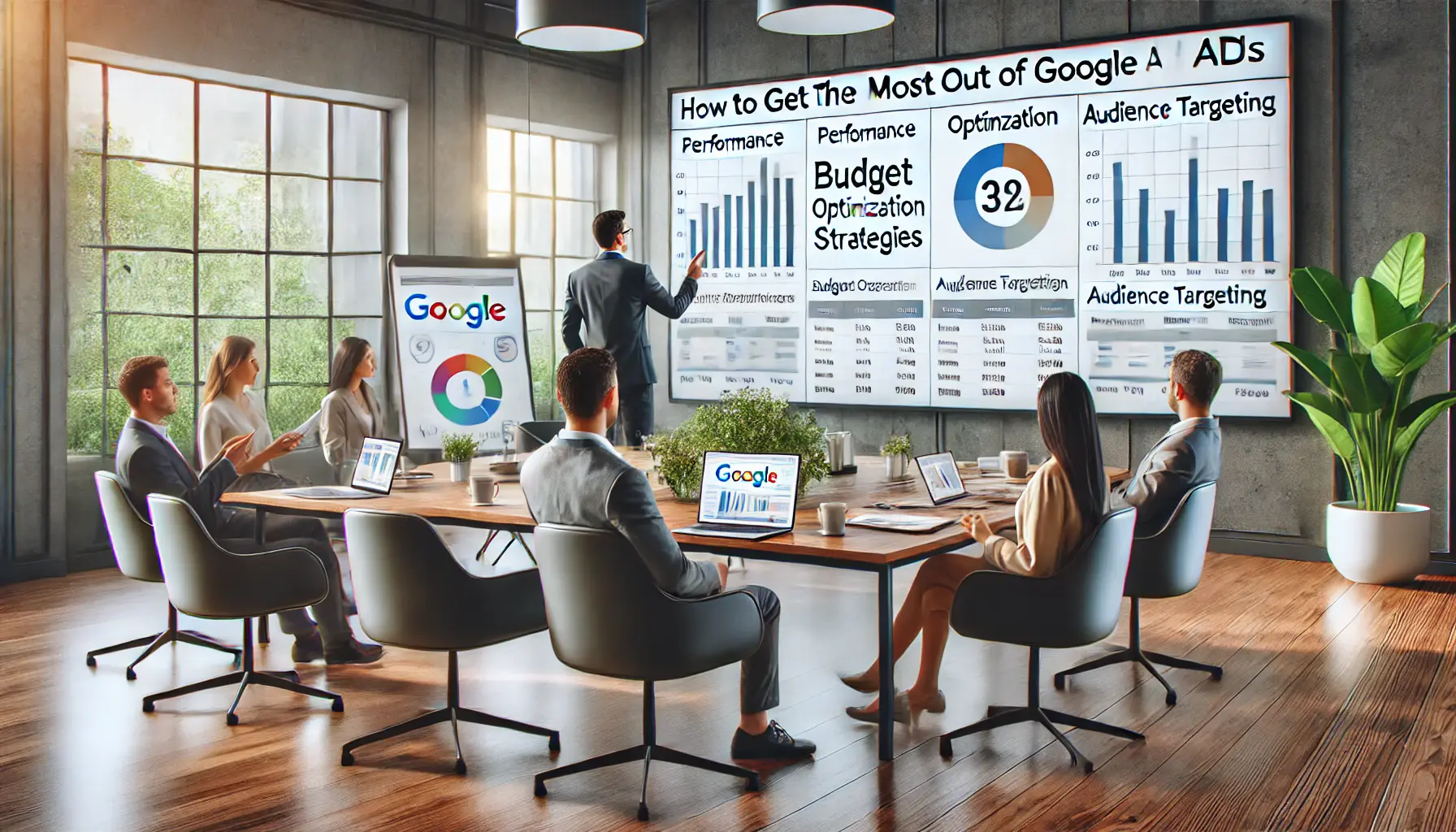
Collaborative analysis and strategic optimization help businesses maximize the benefits of Google Ads Management Services.
How to Get the Most Out of Google Ads Management Services
As effective as Google Ads Management Services are, their success depends heavily on how well businesses collaborate with their service providers.
By adopting the right practices and maintaining a proactive approach, you can maximize the value of these services and achieve your advertising goals more efficiently.

Clear objectives and effective communication are key to aligning team efforts and achieving business goals.
Setting Clear Objectives and Communicating Expectations
Defining clear objectives for your campaigns is key to achieving the best results from Google Ads Management Services.
Consider asking yourself:
- What is the goal of my advertising efforts? Examples include increasing leads, boosting sales, or enhancing brand awareness.
- What metrics will I use to measure success? Determine key performance indicators (KPIs) that align with your goals.
- What timeline am I working within to achieve these goals? Set realistic deadlines for your campaigns.
Once you have identified your objectives, share them with your service provider.
A mutual understanding of goals and expectations ensures that strategies are aligned with your business needs.

Providing accurate business insights ensures effective collaboration and helps the service provider deliver optimal results.
Providing the Service Provider with Accurate Business Insights
Your service provider’s success depends on the quality of information you provide.
Share accurate and comprehensive business insights, such as:
- Details about your target audience: Include demographics, interests, and behavior patterns.
- Information about your products or services: Highlight unique selling points (USPs).
- Past campaign data: Share what strategies have worked and what hasn’t in previous campaigns.
These insights enable your provider to develop tailored strategies that drive meaningful results.

Regular review of campaign performance ensures continuous optimization and improvement of ad results.
Regularly Reviewing Campaign Performance Reports
Google Ads Management Services typically provide detailed performance reports.
Make it a habit to review these reports regularly to:
- Track the progress of your campaigns: Compare results against established KPIs.
- Identify areas for improvement: Pinpoint aspects of the campaign that need adjustments.
- Understand audience behavior: Gain insights into what resonates with your audience and what doesn’t.
Discuss these findings with your service provider and collaborate on necessary adjustments to maintain campaign efficiency.

Effective collaboration fosters creative campaign strategies that drive successful marketing results.
Collaborating on Creative Campaign Strategies
Although your service provider handles the technical aspects of campaign management, your input is invaluable for creative strategies.
Collaborate with your provider to:
- Brainstorm new ad copy ideas: Ensure the messaging resonates with your target audience.
- Explore innovative ad formats: Experiment with platforms or formats to expand your reach.
- Develop seasonal or event-based campaigns: Align campaigns with specific business goals and occasions.
Active participation in the creative process ensures that your campaigns reflect your brand identity and appeal to your audience.

Continuous improvement is key to achieving long-term success in digital marketing campaigns.
Ensuring Long-Term Success With Continuous Improvement
Digital advertising is not a one-time effort but a continuous process of optimization.
To ensure long-term success, work with your service provider to:
- Test new strategies: Regularly try new approaches and refine existing ones.
- Stay updated with industry trends: Adapt to changes in the advertising landscape to remain competitive.
- Monitor competitor activity: Analyze competitors’ strategies and adjust your approach accordingly.
Continuous improvement keeps your campaigns competitive and ensures sustained growth over time.
By following these tips, you can bring maximum value to the services offered by Google Ads Management and create a strong foundation for advertising success.
Collaboration, clear communication, and a commitment to improvement are key to realizing the full potential of these services.
Collaborating with your service provider, setting clear goals, and reviewing performance regularly ensures maximum effectiveness.
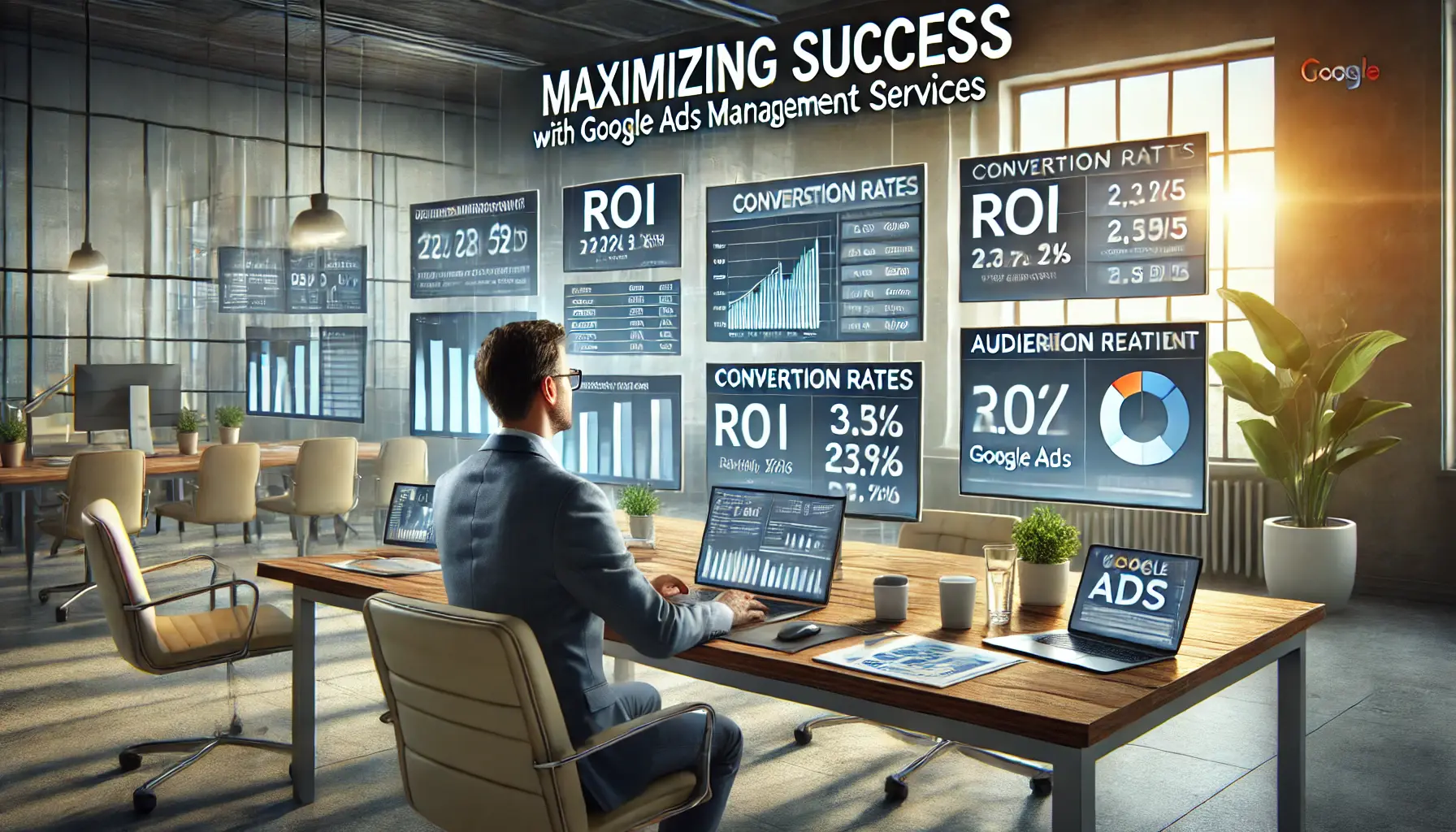
Maximizing success with Google Ads Management Services involves analyzing performance data and optimizing campaigns for better results.
Maximizing Success with Google Ads Management Services
Google Ads Management Services are a must-have for businesses looking to thrive in the competitive space of digital advertising.
These services bring professional expertise to optimize campaigns for success, offering businesses significant advantages such as better ROI, lower costs, and enhanced brand visibility.
Let’s revisit some of the key takeaways from this article to help you maximize the benefits of these services.
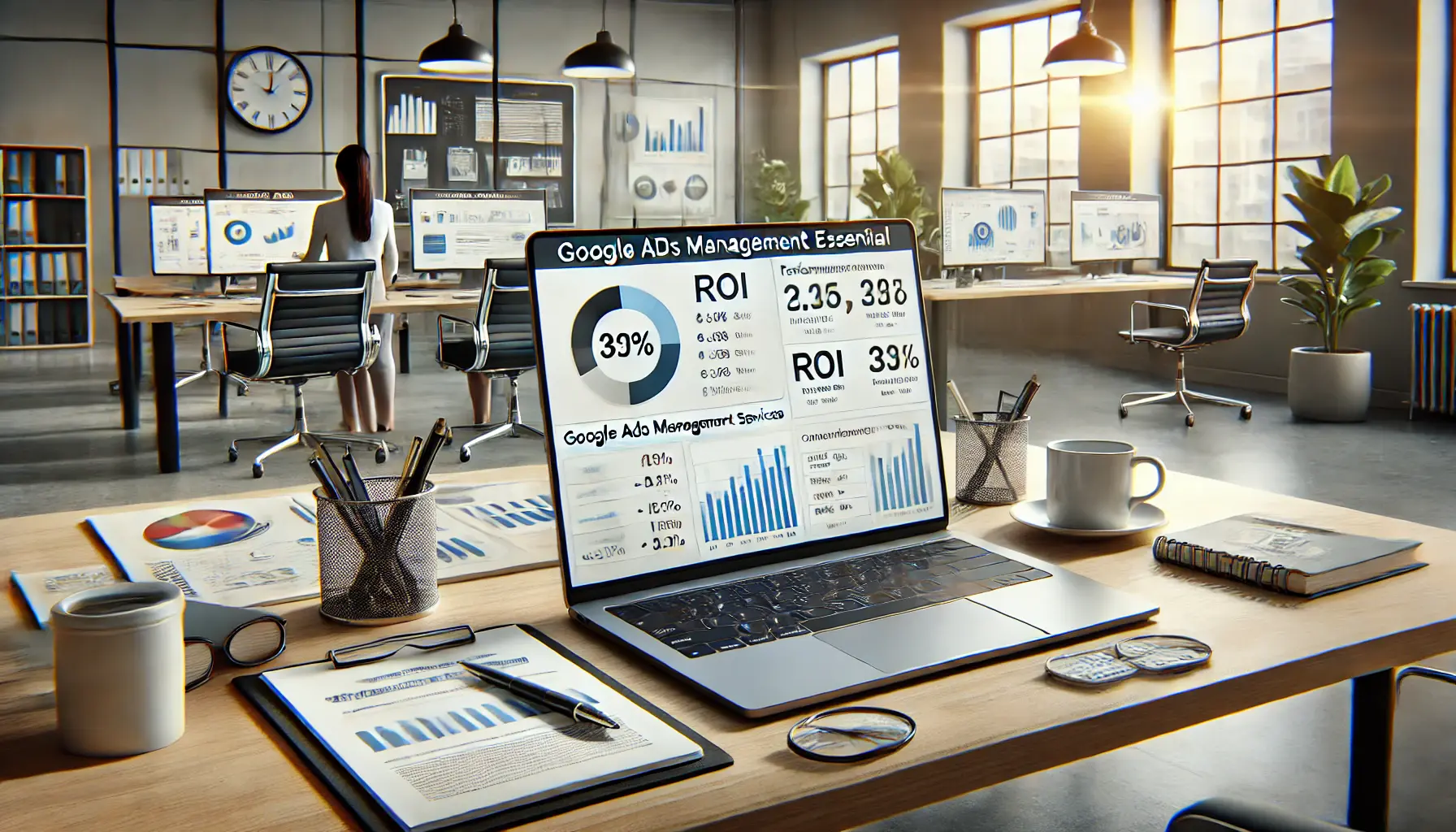
Google Ads Management Services are essential for optimizing digital marketing campaigns and achieving successful outcomes.
Why Google Ads Management Services Are Essential
Google Ads Management Services simplify the complexities of running advertising campaigns while delivering measurable results.
From keyword optimization to performance analysis, these services manage every aspect of campaign execution, allowing businesses to focus on their core operations.
Investing in these services means entrusting your advertising efforts to experts who stay updated with industry trends and technological advancements.

Effective campaign management involves collaboration, data analysis, and strategic planning to achieve optimal results.
Key Strategies for Effective Campaign Management
Throughout the article, we highlighted several strategies that Google Ads Management Services employ to drive campaign success, including:
- Optimizing keywords to maximize reach and relevance.
- Creating compelling ad copy to resonate with the target audience.
- Implementing A/B testing and performance monitoring to refine campaigns.
- Managing bids and optimizing budgets for enhanced cost-efficiency.
- Integrating advanced analytics to derive actionable insights.
These strategies ensure that every dollar spent on advertising contributes to achieving your business goals.

Maximizing the value of Google Ads Management Services involves strategic analysis and continuous optimization of campaigns.
Tips to Maximize the Value of These Services
Success with Google Ads Management Services also depends on how businesses engage with their service providers.
To get the most out of these services:
- Set clear objectives and communicate your expectations effectively.
- Provide accurate and detailed insights about your business and target audience.
- Review campaign performance reports regularly and collaborate on improvements.
- Participate actively in the creative process to ensure campaigns align with your brand identity.
- Commit to continuous improvement by testing new strategies and adapting to industry trends.
By adopting these practices, businesses can ensure long-term success in their digital advertising efforts.

Looking ahead in digital marketing requires forward-thinking and long-term strategic planning to drive future success.
Looking Ahead
In a continuously evolving digital advertising landscape, businesses must adopt innovative strategies and professional management services to stay ahead.
Google Ads Management Services provide the expertise and tools to navigate this dynamic environment, delivering sustained growth and measurable results.
By partnering with the right service provider and maintaining a proactive approach, your business can unlock the full potential of digital advertising.
Investing in Google Ads Management Services is not just about improving ad performance—it’s about building a bigger and better brand in today’s digital-first world.
With clear goals, strategic partnerships, and continuous optimization, your business can achieve remarkable success in its advertising endeavors.
To sustain success, focus on continuous improvements, adapting to industry trends, and leveraging advanced analytics tools.

Addressing frequently asked questions about Google Ads Management Services ensures clients understand key strategies and campaign performance.
Your campaigns can be managed by an agency specialized in Google Ads, check out our service page.
Frequently Asked Questions About Google Ads Management Services
Google Ads Management Services can be quite complex to comprehend, especially for those new to digital marketing.
Below are answers to some of the most frequently asked questions about these services to help clarify their purpose and benefits.
These services involve managing Google Ads campaigns, including keyword research, bid adjustments, ad creation, and performance tracking.
They optimize advertising efforts and deliver measurable results for businesses.
Using these services saves time, reduces costs, and ensures expert strategies to improve ROI.
Professionals optimize campaigns to target the right audience effectively, driving better performance and results.
By optimizing ad campaigns through data-driven strategies, targeting relevant audiences, and refining bids, these services increase conversions while minimizing wasted ad spend, thereby improving return on investment.
Costs vary based on the provider, business size, and campaign scope.
Most providers charge a percentage of ad spend or a flat fee for their services.
Yes, small businesses can benefit significantly.
These services help optimize limited budgets, improve ad performance, and achieve goals like brand visibility and lead generation effectively.
Services typically include keyword research, ad creation, campaign setup, bid management, A/B testingA method of comparing two versions of a webpage or ad to determine which performs better., and ongoing performance monitoring with detailed reporting.
Look for providers with a proven track record, transparent processes, industry expertise, and customized strategies that align with your business objectives and goals.
Yes, Google Ads Management Services can be tailored to fit various industries, ensuring campaigns are designed to meet the unique needs and audience of each sector.
Results can vary depending on the campaign goals and complexity.
Most businesses notice measurable improvements within a few weeks to a few months of optimization.

